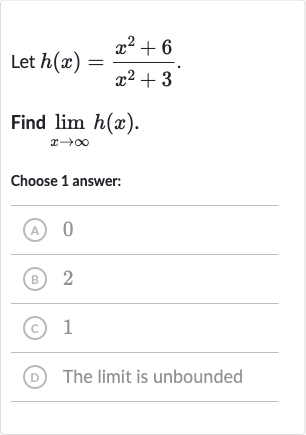Full solution
Q. Let .Find .Choose answer:(A) (B) (C) (D) The limit is unbounded
- Given function: We are given the function . To find the limit as approaches infinity, we can divide the numerator and the denominator by , the highest power of in the denominator.
- Dividing numerator and denominator: Divide each term in the numerator and the denominator by :
- Simplifying the expression: Simplify the expression by canceling out the terms and evaluating the limits of the remaining terms as approaches infinity:
- Evaluating the limit: As approaches infinity, the terms and approach :
- Simplifying the limit: Simplify the expression to find the limit:
- Final value of the limit: The final value of the limit is:
More problems from Power rule
QuestionGet tutor help
QuestionGet tutor help
QuestionGet tutor help
QuestionGet tutor help
QuestionGet tutor help



